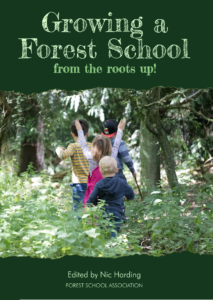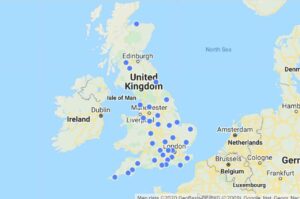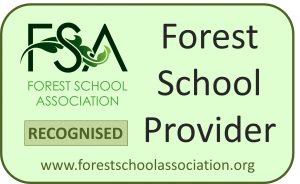What is the Forest School Association?
The FSA is a membership association. There are many different types of membership association; clubs, political parties, unions and professional associations (bodies). Each represents members’ interests where those members have common values or norms that regulate their behaviour. All membership associations, to some extent, address the interests of both the individual members and the ‘public good’.
The FSA asserts its position as the professional body for Forest School in the UK.
Professional bodies tend to stress the primacy of the public good and the ‘service ideal’. This is what motivates professionals to pool their resources. Professional associations do, however, often have to appeal to the individual’s interest in private benefits.
A professional body helps a profession communicate and stay cohesive by recognising both commonalities and differences. It is united on the basis of common knowledge and expertise. Professional associations ascribe to a culture of consensual collective efforts to preserve a profession’s unified front. Professional associations try to protect the profession’s status, interests, and job independence on a broad level by promoting its public image and exclusiveness to expertise. Professional issues, such as the improvement of the occupation’s standards and expertise, are central concerns.
One of the functions of professional bodies is to put people together in committees and working groups. A consequence of such interactions is the establishment of a unified culture for the profession, the institutionalisation of professional codes of conduct, establishment of educational and performance standards, and the diffusion and incorporation of change and innovation within the profession.
Professional bodies also strive for their membership’s upward mobility and economic rewards; instead of presenting this as a clear agenda item, compared with other types of association, they try to accomplish their goal indirectly by attempting to improve the image of the profession and persuade the public of how valuable and indispensable are the knowledge and special skills of the practitioners. In other words, a professional body deals more at the level of broad public relations.
How and why did the FSA come about?
In the lead up to the formation of the FSA there was a general appreciation, within the Forest School community, that the prevailing ‘everyone for themselves’ state was resulting in harm to both the market and to the Forest School ethos itself. This was characterised by an apparent ‘race to the bottom’ at the level of Forest School Training and by a serious dilution of what Forest School meant in the minds of the public.
As the term ‘Forest School’ gained traction in the public consciousness under qualified trainers started delivering the new Forest School qualifications (barriers to their entry, as set by the Awarding Organisations, were surprisingly low) and unqualified people started calling their woodland activities ‘Forest School’, regardless of the content.
In this context some Forest School trainers tried to differentiate themselves by offering a ‘higher quality’ level of service. This was by no means a purely subjective matter, there was doubtless good quality Forest School training happening, although claims to be ‘the best’ may have been going a bit too far.
In the absence of any objective measures for quality of Forest School training there was no way for people to directly compare trainers. In many cases the reputation of the trainer appeared to be taken as a measure of the ability of the practitioner. Trainees and qualified practitioners are naturally emotionally and financially invested in their training and this may have resulted in a strange, certainly from a Forest School perspective, form of partisanship. Did practitioners believe that their Forest School qualification was only as good as the esteem in which their trainer was held? With nothing else for them to go on that may make sense although, ironically, it does imply that the Forest School ethos had not been well understood in all cases, which serves to illustrate that simply having the Level 3 Forest School qualification does not necessarily mean that you are an effective Forest School practitioner.
There was a desire by Forest School practitioners to network and share good practice. Local groups started to appear and were often effective. However, their scope of interest did not run to the national or strategic issues facing Forest School.
However, by the by, attempts were made by members of the Forest School community to bring order by providing some consensual normative structures. Most notable of these were:
- The Forest School Principles capturing the ethos and values of Forest School such that most practitioners and trainers could ascribe to them.
- The creation of the GB Forest School Trainers Network to create and standardise qualifications and assessments.
- The Institute of Outdoors Leaning Forest School Special Interests Group (IOLSIG) – to start to bring the community together at a national level and address strategic issues.
It was from the IOLSIG that the FSA emerged. Forest School was simply too big to sit within the structure of IOL. It needed its own representative organisation. A committee was formed to develop the idea. They created the core purposes, objectives and priorities for the new organisation. It was a blank sheet of paper. The interests and aspirations for the whole community had to be captured and brought to bear through this new structure.
Some people wanted to create a Union with advocacy and collective bargaining for FSA members. Some people wanted a National Governing Body to create and enforce standards. Some people saw this as being the equivalent of the ‘Forest School police’. Some people wanted nothing to do with the FSA at all. Some wanted to wait and see what would happen.
Ultimately, it was agreed that… The Forest School Association is the professional body and UK wide voice for Forest School, promoting best practice, cohesion and ‘quality Forest School for All’.
Its objectives were stated as being …
- Communicate a strong, clear vision of what Forest School is.
- Develop and maintain the curriculum content for approved Forest School qualifications.
- Work together to increase opportunities for people to experience quality Forest School in the UK.
- Provide a central point for collecting, storing and sharing information about Forest School and good practice in Forest School (including notes on good practice, advice on choosing leaders, and advice on choosing trainers).
- Stimulate, store and share practitioner and academic research and learn from it.
- Work collaboratively with other organisations with similar goals and in related areas.
These objectives were entirely consistent with the purposes of a professional body.
A change to our Memorandum and Articles of Association, in 2014, saw our charitable objects defined as …
‘The advancement of education for public benefit through promotion and support of quality Forest School in the United Kingdom using any means to enable all children, young people and adults to benefit from increased opportunities for high quality and varied educational experiences in the natural world.’
Again, this was entirely consistent with our purpose as a professional body.
Progress to date
We can consider our progress to date through the lens of our purpose as a professional body.
The initial years were spent pulling people together using the concept of ‘the public good’. Things like…
- having a united voice for Forest School
- promoting the agreed Forest School ethos (6 principles of Forest School)
- creating a code of conduct for FSA members
- Representing Forest School at a national level
- Newsletters for members
- National conference
Early adopters joined the FSA as individual members to support this idea of the ‘greater good’ for our professional community. As time went on our membership increased along with a demand for greater private member benefits. Attempts were made to address this through things like …
- Negotiated member discounts
- Collation of knowledge (case studies and articles) on the website.
- Production of FSA guidance notes
- More frequent bulletins and news items on the website
- Networking opportunities though local groups
- Access to the jobs board
There were calls for the FSA to tackle the issue of variable standards in Forest School at every level. However, we were also repeatedly told that ‘the horse had bolted’. Nevertheless, we attempted to do this in as consensual and inclusive way as possible.
The FSA had taken on a ‘gatekeeping role’ for the Forest School qualifications that had been developed by the GB Forest School Trainers Network and Open Collage Network West Midland Region.
The FSA board agreed that having a Forest School Trainer quality assurance scheme in place was the most strategically important objective for our community due to the leverage that this would have on Forest School standards and quality nationally. This was an inherently difficult task made more difficult by early strong resistance from some trainers that objected to submitting to such a scheme. In fact, in the early days, some went so far as to demand that the FSA recognise their quality outside of, and in advance of the QA scheme being developed. The Trainers QA scheme stage 1 is now open and the whole scheme is just a couple of months from being complete.
While the trainers QA scheme was being negotiated and developed it was apparent that something needed to be done to try to raise the barriers to entry for Forest School Trainers. The FSA worked with OCNWMR and other Awarding Organisations to ensure that the FSA endorsed qualifications were only being used by trainers who had a certain minimum level of Forest School experience themselves. Such Awarding Organisations would be endorsed by the FSA although this said nothing about the quality of the Forest School training being delivered by the trainers. This initiative was a partial success. Some Awarding Bodies did not seek FSA endorsement and continue to allow under qualified trainers to deliver their qualifications.
The six principles of Forest school underpinned a collective understanding of the Forest School ethos.
Principle five is ‘Forest School is run by qualified Forest School practitioners who continuously maintain and develop their professional practice’. The problem of unqualified people claiming to be practicing Forest School was understood and in July 2014 the FSA launched the ‘Verified Forest School Practitioner’ scheme in which we checked that individual members had the necessary Forest School qualification. They were then listed on a public facing database. It was an early attempt to improve standards by promoting members who were, at least, appropriately qualified. However, this only addressed one of the 6 Forest school Principles.
The idea of what constituted ‘long term’, within Principle 1, was particularly problematic. Although the majority of people seemed to understand what this meant, a culture of offering short term (6-24 weeks) programmes had developed as a sub-set of the market. This was being justified, in terms of still being Forest School, by things like budgetary and market considerations. The 6 weeks of delivery, required as part of the Level 3 Forest School qualification, also seemed to be creating some confusion. None of these explanations altered the fact that such short term programmes fell some way short of meeting the Forest School principle of ‘long term’.
In 2017 the FSA developed and launched a ‘FSA Recognised Forest School Provider’ scheme and membership type to allow the public to be able to readily identify Forest School providers and for our members to be able to market their Forest School services. This was met by two forms of resistance.
-
- Those current members that were unable to meet the criteria of the membership type because they were doing short term programmes that did not qualify.
- Those current members who are qualified to deliver FS programmes, who do not deliver Forest School programmes of any duration, but who want to be able to market their non-Forest School services through the FSA.
The problem of short term programmes being marketed as FS was so extensive that the FSA decided to encourage those providers by including them as ‘Recognised Introductory FS Providers’. This was on the understanding that they aspired to deliver FS programmes in the future. Such a move fits well with the culture of a professional body that is trying to stay cohesive by recognising both commonalities and differences and is making a consensual collective effort to preserve a profession’s unified front.
Who is the FSA here to serve?
Notwithstanding our charitable aims, we are a membership organisation and answerable to our members. As a professional body, we concentrate on the public good. However, it does need to be acknowledged that private benefits are very important to many of our members.
Who are our members? We started with an open membership policy. This was highly inclusive. From a Forest School perspective being inclusive is about ‘including many different types of people and treating them all fairly and equally’. The purpose of a professional body is to represent the interests of those people who practice that profession and who share the same values.
The FSA is setting professional standards through its trainers’ quality assurance scheme and Recognised Forest School Provider membership. Although some members may not yet be in a position to meet these professional standards there is a home for them in the FSA so long as they share our values and, if practicing, aspire to deliver Forest School in accordance with the 6 Forest School principles. In this way the FSA offers equality of opportunity. Anyone may join the FSA as an individual member so long as they agree to abide by the code of conduct for FSA members.
Gareth Wyn Davies
Forest School Association CEO





Where can you find details on who the endorsed awarding bodies are?
https://forestschoolassociation.org/policy-statement-uk-awarding-bodies-offering-forest-school-qualifications/
As a full time headteacher who maintains her teaching practice in classrooms and has led Forest School sessions for Y4, Y6 and Early Years over the past two and a bit years and has planned for every child in 210 place primary school to have Forest School sessions this year I am pleased that this issue of being recognised as a Forest School ‘provider’ is being tackled. Though the thought of yet another form and evidence on top of what is already done in schools is slightly irritating and smacks of the ‘badge collecting’ schools have had to jump through for Healthy Schools, Arts Mark, Sports Mark to prove we are doing something, though in reality we are often doing what is required but do we really need the badge?! Forest School for me is different I have invested a lot of time and money in my current school and my previous school to ensure that quality FS opportunities are available for children. I want our school community to be recognised for the work we do and what we offer our children. I have qualified as a Level 3 Forest School Leader and have helped to provide training opportunities for others. However with my ‘headteacher’ head on this is getting harder to do; we have a serious shortfall in budgets coming along the path and ensuring we have good teachers in the classrooms tends to take priority! Not all heads need pushing, some of us are doing the pushing but we are against a brick wall that is not always of our making.
Thank you for sharing your perspective as a headteacher Amanda. A good reminder that each situation is different. The risk / benefit balance is important to get right and we are feeling our way forward with it.
Thank you for this Gareth. A very useful account of the FS journey along with clear explanations as to the value of a FS providers scheme. As a trainer I will find this useful in framing the content of my application form, the headteacher’s/ managers agreement documentation and handouts.
It is detailed but succinct enough for Forest School Leaders to share with their settings, managers, employers and clients. The providers scheme gives us all something to aim for, in line with the Institute For Outdoor Learning and Learning Outside the Classroom quality badges.
I am one of the trainers going through the robust QA pilot process and am finding it a valuable tool for improving my practice. Hard work but really worth it!
This is a really useful summary (and I don’t think it could be any shorter). I hope it will remind members that this is a membership organisation that can only be effective when members engage and take ownership of it by contributing in whatever ways are open to them. Its not ‘them and us’, it is ‘we as a community’.
A community of disparate souls with a common purpose and some cracking principles, Sara, that really do make a difference to the lives of many. Together we will challenge some of the damaging nonsense around ‘safety’ and give children and young people a voice. Let’s ‘conker’ the world? (kindly and one frightened adult at a time)
Yes, very good, must have taken ages to put that together but think it could have been more concise and less long winded. As you have probably guessed that I am no academic.
I have been a member for over three years and have no means of showing my being a member ie,a professional emblem or proper badge to show my membership of our organisation. Come on FSA its not a lot to ask. Martin.
Thanks for this Gareth. I think a really useful piece of work. Hopefully it will go someway to keeping everyone happy ?.
If the’ long term’ issue is proving so emotive, is the FSA doing enough to support practitioners (who I assume would love to offer long term forest school delivery) in promoting the need for this and pushing schools to take this on board? Rather than individual practitioners struggling on against their respective Heads, one role of the FSA could be to take these individual struggles on board and promote this issue nationally with a unified campaign directed at central government.
Just a thought.
Thank you for this comment Ruari. The board are having a strategy meeting early next year to consider the scope of our future work. I strongly suspect that this will be an issue on the table.
A link on the facebook page to this to promote the work to wider community might be useful?
Will do Arainn. There will be a link from the bulletin also.
great 🙂
Very Good. Thank you.